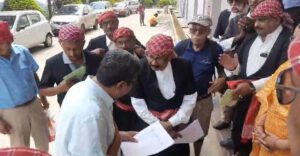During the British-era census records (1871-1931) it accurately identified Kodavas as a distinct ethnic group separate from the caste system. The Kodava National Council has demanded that the same criteria should be followed now also in the case of Kodavas .
CNC President N.U. Nachappa and its members, who staged a peaceful protest in front of the Madikeri Deputy Commisioner’s office recently, demanded that in the census records from 1941 to 2011 it was wrongly classified Kodavas as a caste should be cancelled.
Speaking on the occasion , N.U. Nachappa said that the historical errors that have deprived the distinct ethnic group of Kodavas of their rightful place should be corrected. Kodavas should be recognized as a single and distinct ethnic group limited to the original Kodava community. He demanded that any reference to caste associated with Kodavas should be removed.

The Kodava community is one community where there is no caste, sub-caste, sub-tribe in the Kodava community. We are Kodavas and our maternal roots are confined to Kodavaland only. Outside Kodavaland, we have no cultural roots. From ancient times till today, we have retained our unique identity as a community. Kodava traditional rituals, folk legal systems, Kodava way of life, kinship, Kodava mother tongue, art works, Jogula, ballads, folk dances, songs, dress, food, ancestor worship and religious cycles all revolve around the divine river Cauveri. We Kodavas speak our own mother tongue, Kodava Thak. There is no “Saptapadi” ritual in our marriages. Instead, the bride’s mother ties the sacred “Pathak” around the bride’s neck on the night before the wedding.
The size of the Kodava community has decreased because we have faced various wars and invasions so far, which is similar to the “Evil Trail of Tears” of the Native American Red Indians of America.
Now, with our dwindling numbers, we have been marginalized, overlooked, discriminated against and neglected and we find ourselves in a vulnerable position. Our identity and existence are being challenged by immigrants who are trying to assimilate through immigration.
Now, this unique, subtle, sub-primeval Kodava community should be constitutionally protected under the United Nations Charter. We know that our Constitution undertakes to protect its citizens without any discrimination on the basis of religion, language, sex or race. However, there is no specific clause in our Constitution to protect race.
Therefore, untill presence of Sun and the Moon, to protect, preserve and promote this rare human species of the Kodava race, the amendment of our Constitution is a monumental historical necessity in the interest of natural and universal global justice. N.U. Nachappa asserted that the non-recognition of the Kodava community as a distinct indigenous race in the constitutional documents of India and the lack of proper nomenclature have significant consequences.
Rekha Nachappa, Kalianda Prakash, Almanda Jai Ganapathy, Pattamada Kush, Ajjikuttira Lokesh, Bottangada Girish, Areyada Girish, Mandapada Manoj, Kandera Suresh, Katumanianda Umesh, Kiriamada Sherin, Koopadira Sabu, Puttichanda Don Devaiah, Bepadyanda Biddappa, Cholapanda Nanaiah, Medura Kanthi Kunmappa, Bollajira B. Ayyappa, Mukonda Dilip, Nandetira Ravi Subbaiah, Chanda Chami Palangappa, Parvanga Naveen, Appeyangada Male Poonachcha, Acchakalera Ramesh, Awaremadandanda Ramesh participated in the protest and submitted a petition to the government through the district administration.


